Sixth Sunday of Easter
May 5, 2013 Cycle C
White priestly vestments symbolize purity and integrity of the
life of faith.
Home Page
Liturgical
Year Cycle C 12-13
Introductory Acts Of Worship
The Entrance Prayers:
On Sunday, usually a hymn praising God
is sung in place of reciting a Psalm from the Bible which invites us to
enter more deeply into the mystery of God's love for us. The recited
weekday Psalm expresses a youthful heart and spirit, delighted that we may come
before the living God.
Entrance Song
/ Entrance Psalm (Antiphon)
Entrance Song
Isaiah 48:20 Proclaim a
joyful sound and let it be heard; proclaim to the ends of the earth: The Lord
has freed his people, alleluia.
The Priest Approaches and Kisses the Altar:
The
altar is a symbol of Christ. In it are cut five crosses to recall the five
wounds of Christ. The altar also represents the Church and has embedded in
it the relics of her saints. The priest comes to the altar to celebrate
the Sacrifice in the Church's name. Because of the glory surrounding the
altar upon which the divine Sacrifice will be made, the kiss of the priest
unites the Church to Christ, its Redeemer.
Priest:
In the name of the Father, and of the Son, and of the Holy Spirit.
All:
Amen.
Priest: The Lord be with you.
All: And
with your spirit.
The Penitential Prayers:
We recognize our guilt for past sins,
express our sorrow for them, and ask that Mary, the angels, the saints, and our
brothers and sisters in Christ pray for the Lord God's mercy. (The priest
may select from several forms).
Priest: Brothers and sisters, let
us acknowledge our sins, and so prepare ourselves to celebrate the sacred
mysteries.
Priest: You were sent to heal the contrite of heart: Lord, have
mercy.
All: Lord, have mercy.
Priest: You came to call sinners: Christ, have mercy.
All: Christ, have mercy.
Priest: You are seated at the right hand of the Father
to intercede for us: Lord, have mercy.
All: Lord, have
mercy.
The Absolution:
Priest: May almighty God have
mercy on us, forgive us our sins, and bring us to everlasting life.
All:
Amen.
The Gloria:
The Glory of God prayers have existed from
the second century. They repeat the angels praise of God which heralded
the birth of Christ on earth. Our praise is lifted again through the years
as we rejoice at His coming as Lord, God, the most high Jesus Christ, who at
Christmas took on our human nature while at the same time being the son of Man.
This ancient hymn expresses our recognition of God's glory and love. It
calls upon Christ as our holy and divine mediator, and the Holy Spirit who
forever binds us together in God's love.
Priest and All:
Glory to God in the highest, and peace to his people
on earth. Lord God, heavenly King, almighty God and Father, we worship
you, we give you thinks, we praise you for your glory. Lord Jesus Christ,
only son of the Father, Lord God, Lamb of God, you take away the sins of the
world: have mercy on us; you are seated at the right hand of the Father: receive
our prayer. For you alone are the Holy One, you alone are the Lord, you
alone are the Most High, Jesus Christ, with the Holy Spirit, in the glory of God
the Father. Amen.
The Collect:
The
priest lifts the united prayers and petitions of the congregation to God the
Father through the merits of Jesus Christ in the Holy Spirit.
Priest: Let us pray.
Priest: Grant, almighty God, that we may celebrate with
heartfelt devotion these days of joy, which we keep in honor of the risen Lord,
and that what we relive in remembrance we may always hold to in what we do.
Through our Lord Jesus Christ, your Son, who lives and reigns with you in the
unity of the Holy Spirit, one God, for ever and ever.
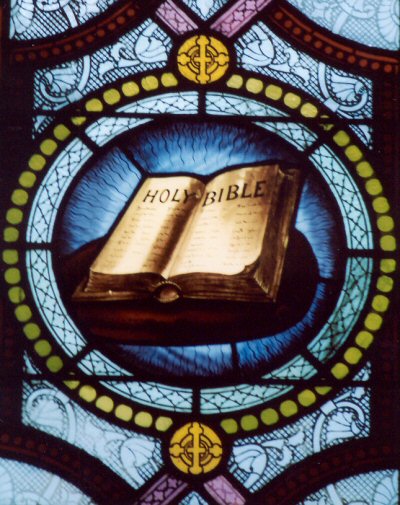 Liturgy
of the Word
Liturgy
of the Word
Christ is made known to us through the
Old Testament which prepares us to recognize Him. In those days, God
inspired men who spoke His message. Now, the New Testament Gospel reading
announces His presence to us directly through His Son. Both
readings bring God's message to us. Our responsibility is to respond.
The First Reading:
From the New Testament.
Acts of the Apostles 15:1-2, 22-29
Some who had come down
from Judea were instructing the brothers, “Unless you are circumcised according
to the Mosaic practice, you cannot be saved.” Because there arose no little
dissension and debate by Paul and Barnabas with them, it was decided that Paul,
Barnabas, and some of the others should go up to Jerusalem to the apostles and
elders about this question.
The apostles and elders,
in agreement with the whole church, decided to choose representatives and to
send them to Antioch with Paul and Barnabas. The ones chosen were Judas, who
was called Barsabbas, and Silas, leaders among the brothers. This is the letter
delivered by them:
“The apostles and the
elders, your brothers, to the brothers in Antioch, Syria, and Cilicia of Gentile
origin: greetings. Since we have heard that some of our number who went out
without any mandate from us have upset you with their teachings and disturbed
your peace of mind, we have with one accord decided to choose representatives
and to send them to you along with our beloved Barnabas and Paul, who have
dedicated their lives to the name of our Lord Jesus Christ. So we are sending
Judas and Silas who will also convey this same message by word of mouth: ‘It is
the decision of the Holy Spirit and of us not to place on you any burden beyond
these necessities, namely to abstain from meat sacrificed to idols, from blood,
from meats of strangled animals, and from unlawful marriage. If you keep free
of these, you will be doing what is right. Farewell.’”
Priest/Reader:
The Word of the
Lord.
All:
Thanks
be to God.
The Responsorial Psalm:
This Psalm praising God, is a prayer to God,
or recommends the practice of virtue. It is sung as an interlude between
the scriptural readings. It provides yet another instructional setting and
invites the assembly to imitate the cantor who sings a repeated response to the
verses of an ancient Psalm many of which are attributed to King David. The
verses are sung first by a cantor (song leader) accompanied by instruments, the
refrain is sung by the people.
Responsorial
Psalm 67:2-3, 5, 6, 8
Cantor: O God, O God, let all the
nations praise you!
All: R/. O God,
O God, let all the nations praise you!
Cantor: May
God have pity on us and bless us; may he let his face shine upon us. So may
your way be known upon earth; among all nations, your salvation.
All: R/. O
God, O God, let all the nations praise you!
Cantor: May
the nations be glad and exult because you rule the peoples in equity; the
nations on the earth you guide.
All: R/. O
God, O God, let all the nations praise you!
Cantor: May the peoples praise you, O God; may all the
peoples praise you! May God bless us, and may all the ends of the earth fear
him!
All: R/. O
God, O God, let all the nations praise you!
The Second Reading:
Taken from the New Testament,
from the Book of Revelation.
Revelation 121:10-14, 22-23
The angel took me in
spirit to a great, high mountain and showed me the holy city Jerusalem coming
down out of heaven from God. It gleamed with the splendor of God. Its radiance
was like that of a precious stone, like jasper, clear as crystal. It had a
massive, high wall, with twelve gates where twelve angels were stationed and on
which names were inscribed, the names of the twelve tribes of the Israelites.
There were three gates facing east, three north, three south, and three west.
The wall of the city had twelve courses of stones as its foundation, on which
were inscribed the twelve names of the twelve apostles of the Lamb.
I saw no temple in the
city for its temple is the Lord God almighty and the Lamb. The city had no need
of sun or moon to shine on it, for the glory of God gave it light, and its lamp
was the Lamb.
The Alleluia:
An ancient expression of joy anticipating
the Lord's message we will hear in the Gospel.
John 14:23
Cantor: Alleluia!
Alleluia! Alleluia!
ALL: R/. Alleluia! Alleluia! Alleluia!
Cantor: Whoever loves me will keep my word, says the Lord,
and my Father will love him and we will come to him.
ALL: R/. Alleluia! Alleluia! Alleluia!
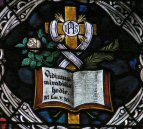 The Gospel:
The Liturgy of the Word is completed
by the reading of the Gospel. Before its reading, the members of the
assembly trace the sign of the cross upon the forehead to indicate their mental
acceptance of the Truth, on the lips to indicate their readiness to announce it,
and over the heart to indicate their sincere desire to accept it into their
lives. The "Good News" of the Gospel tells that God's kingdom has come for
all to hear, accept, and announce to the world for its salvation. It
is God who is speaking to us. Christ comes to teach us by the example of
His life and by His own words.
The Gospel:
The Liturgy of the Word is completed
by the reading of the Gospel. Before its reading, the members of the
assembly trace the sign of the cross upon the forehead to indicate their mental
acceptance of the Truth, on the lips to indicate their readiness to announce it,
and over the heart to indicate their sincere desire to accept it into their
lives. The "Good News" of the Gospel tells that God's kingdom has come for
all to hear, accept, and announce to the world for its salvation. It
is God who is speaking to us. Christ comes to teach us by the example of
His life and by His own words.
The Gospel: John
14:23-29
John wrote to show that Christ was
the Messiah, the Divine Son of God.

Jesus said to his disciples: “Whoever
loves me will keep my word, and my Father will love him, and we will come to him
and make our dwelling with him. Whoever does not love me does not keep my
words, yet the word you bear is not mine but that of the Father who sent me.
“I have told you this
while I am with you. The Advocate, the Holy Spirit, whom the Father will send
in my name, will teach you everything and remind you of all that I told you.
Peace I leave with you; my peace I give to you. Not as the world gives do I
give it to you. Do not let your hearts be troubled or afraid. You heard me
tell you, ‘I am going away and I will come back to you.’ If you loved me, you
would rejoice that I am going to the Father; for the Father is greater than I.
And now I have told you this before it happens, so that when it happens you may
believe.”
Priest: The
Gospel of the Lord.
All: Praise to you, Lord Jesus Christ.
Priest: Through the words of the Gospel may our sins be wiped
away.
The Priest's Sermon:
The priest develops, explains, and comments upon the Master's words,
so our minds may be
enlightened, and our
hearts enriched.
(A priestly reflection upon this Gospel)
Profession of Faith:
We state in the
Nicene Creed the principles of our faith in precise and definite terms.
All: I believe in one God, the Father, the Almighty,
maker of heaven and earth, of all that is seen and unseen. I believe in
one Lord, Jesus Christ, the Only Begotten Son of God, born of the Father before
all ages.
God from God, Light from Light, true God from true God, begotten, not made,
consubstantial with the Father; through him all things were made. For us
men and for our salvation he came down from heaven, and by the Holy
Spirit was incarnate of the Virgin Mary, and became man. For our sake he was
crucified under Pontius Pilate, he suffered death and was buried, and rose again
on the third day in accordance with the Scriptures. He ascended into
heaven and is seated at the right hand of the Father. He will come again
in glory to judge the living and the dead and his kingdom will have no end.
I believe in the Holy Spirit, the Lord, the giver of life, who proceeds from
the Father and the Son, who with the Father and the Son is adored and
glorified, who has spoken through the prophets. I believe in one,
holy, catholic and apostolic Church. I confess one Baptism for the
forgiveness of sins and I look for the resurrection of the dead and the
life of the world to come. Amen.
General Intercessions:
We pray for the needs of the pope, civic
leaders, our own needs, those of others,
the sick, the dying, those who have died, the church, and the world.
The response of all to each intercession: Lord, hear our prayer.
All: Lord,
hear our prayer.
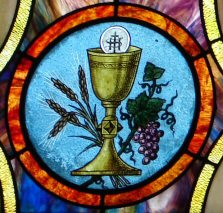 The Liturgy of the Eucharist
The Liturgy of the Eucharist
Gifts of bread and wine
symbolizing ourselves are presented to the priest who will offer them to God the
Father. Through the Holy Spirit, they will become the Body and Blood of
Jesus Christ whom we receive in Holy Communion. Jesus unites Himself with
us for our spiritual nourishment and strength. Today, when individuals do
not present their own personal offerings of bread and wine, the monetary contribution
symbolizes the material of their united sacrifice. The priest makes and
offering of the bread and wine to God.
Preparation of the Bread and
Wine:
Priest: Blessed are you, Lord God of all creation,
for through your goodness we have received the bread we offer you:
fruit of the earth and work of human hands, it will become for us the bread of
life.
All:
Blessed be God for ever.
Priest: By
the mystery of this water and wine may we come to share in the divinity of
Christ, who humbled himself to
share
in our humanity.
Priest: Blessed are you, Lord God of all creation, for through your goodness we have
received the wine we offer you; fruit
of the vine and work of human hands it will become our spiritual drink.
All: Blessed be God for ever.
Priest: With
humble spirit and contrite heart may we be accepted by you, O Lord, and may our
sacrifice in your sight this
day be pleasing to you, Lord God.
The Priest's Hands are Washed: This
act was traditionally necessary because the priest handled the various gifts
presented by the people. Now, the cleansing act using water reminds the
priest and ourselves of the need to cleanse not only the hands but the soul.
Soon, the priest's hands will hold the actual body of Christ, and we will become
His dwelling place.
Priest: Wash
me o Lord, from m iniquity and cleanse me from my sin.
Pray, brethren, that
my sacrifice and yours may be acceptable to God, the almighty Father.
All: May the Lord accept the sacrifice at your hands for the praise and glory of his
name, for our good and the good of
all his holy Church.
Prayer over the Gifts:
Speaking in our name, the priest asks
the Father to accept the gifts we offer through him.
Priest: May
our prayers rise up to you, O Lord, together with the sacrificial offerings, so
that, purified by your graciousness, we may be conformed to the mysteries of
your mighty love. Through Christ our Lord.
Eucharistic Prayer:
(Number Four: The priest may select from several forms).
Priest: The Lord be with you.
All: And with your
spirit.
Priest: Lift up your hearts.
All: We lift them up to the Lord.
Priest: Let us give thanks to the Lord, our God.
All: It is right
and just.
Preface Prayer:
Priest: It is truly right and just, our duty and our
salvation, at all times to acclaim you, O Lord, but on this day above all to
laud you yet more gloriously, when Christ our Passover has been sacrificed.
For he is the true Lamb who has taken away the sins of the world; by dying he
has destroyed our death, and by rising, restored our life. Therefore,
overcome with paschal joy, every land, every people exults in your praise and
even the heavenly Powers, with the angelic hosts, sing together the unending
hymn of your glory, as they acclaim:
Acclamation:
Priest
and All:
Holy, Holy, Holy Lord, God of hosts. Heaven and
earth are full of your glory. Hosanna in the highest.
Blessed
is he who comes
in the name of the Lord. Hosanna in the highest.
Priest: We give you praise, Father most holy, for you are
great and you have fashioned all your works in wisdom and in love. You
formed man in your own image and entrusted the whole world to his care, so that
in serving you alone, the Creator, he might have dominion over all creatures.
And when through disobedience he had lost your friendship, you did not abandon
him to the domain of death. For you came in mercy to the aid of all, so
that those who seek might find you. Time and again you offered them
covenants and through the prophets taught them to look forward to salvation.
And you so loved the
world, Father most holy, that in the fullness of time you sent your Only
Begotten Son to be our Savior. Made incarnate by the Holy Spirit and born
of the virgin Mary, he shared our human nature in all things but sin. To
the poor he proclaimed the good news of salvation, to prisoners, freedom, and to
the sorrowful of heart, joy. To accomplish your plan, he gave himself up
to death, and, rising from the dead, he destroyed death and restored life.
And that we might live no
longer for ourselves but for him who died and rose again for us, he sent the
Holy Spirit from you, Father, as the first fruits for those who believe, so
that, bringing to perfection his work in the world, he might sanctify creation
to the full.
Priest: Therefore, O Lord, we pray: may this same Holy Spirit
graciously sanctify these offerings, that they may become the Body and Blood of
our Lord Jesus Christ for the celebration of this great mystery, which he
himself left us as an eternal covenant.
The priest repeats the words which
Christ used at his Last Supper when He changed the bread into His Body and the
wine into His Blood. His Body and Blood are truly present but under the
appearance of bread and wine. The death of Christ is prolonged in each of
those who receive Him worthily. We apply His death to ourselves so that we
may share His glory. This moment is the most solemn on earth because it is
Divine act which enables us to apply to ourselves the Cross which Christ
willingly took upon Himself.
We are called to die to sin and lift our very selves to
God so that we become changed; to do as God would have us do, to become
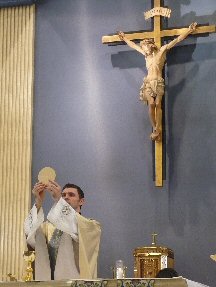 what
God would have us become. Our own little cross can lift us into union with
Christ's Cross so we may earn the joys of
everlasting happiness with God the Father.
what
God would have us become. Our own little cross can lift us into union with
Christ's Cross so we may earn the joys of
everlasting happiness with God the Father.
The
Lord's Supper:
For when the hour had come for him
to be glorified by you, Father most holy, having loved his own who were in the
world, he loved them to the end: and while they were at supper, he took bread,
blessed and broke it, and gave it to his disciples, saying:
Take this, all of
you and eat of it: this is my Body which will be given up for you.
In a similar way, taking the chalice filled with the fruit of the vine, he
gave thanks, and gave the chalice to his disciples, saying:
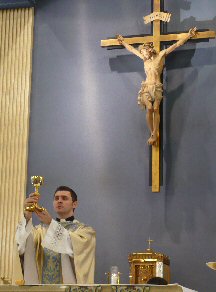 Take this, all of you, and drink from it; for this is the chalice of my
Blood, the Blood of the new and eternal covenant, which will be poured out for
you and for many for the forgiveness of sins. Do this in memory of me.
Take this, all of you, and drink from it; for this is the chalice of my
Blood, the Blood of the new and eternal covenant, which will be poured out for
you and for many for the forgiveness of sins. Do this in memory of me.
Memorial Acclamation: (The priest may
select from several forms).
Priest: The
mystery of faith.
Priest
/ All: When we
eat this Bread and drink this Cup, we proclaim your Death, O Lord, until you come
again.
Memorial Prayer: (The
priest may select from several forms).
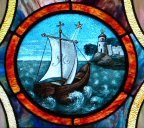 Priest:
Priest:
Recalls Christ's Passion, Resurrection, Ascension, the Church,
the dead, and ourselves.
Therefore, O Lord, as we celebrate the memorial of our redemption, we
remember Christ's Death and his descent to the realm of the dead, we proclaim
his resurrection and his Ascension to your right hand, and, as we await his
coming in glory, we offer you his Body and Blood, the sacrifice acceptable to
you which brings salvation to the whole world.
Look, O Lord, upon the Sacrifice which you
yourself have provided for your Church, and grant in your loving kindness to all
who partake of this one Bread and one Chalice that, gathered into one body by
the Holy Spirit, they may truly become a living sacrifice in Christ to the
praise of your glory.
Therefore, Lord, remember now all for whom we
offer this sacrifice: especially your servant _____ our Pope, _____ our Bishop,
and the whole Order of Bishops, all the clergy, those who take part in this
offering, those gathered here before you, your entire people, and all who seek
you with a sincere heart. Remember also those who have died in the peace
of your Christ and all the dead, whose faith you alone have known.
To all of us, your children, grant, O
merciful Father, that we may enter into a heavenly inheritance with the Blessed
Virgin Mary, Mother of God, and with your Apostles and Saints in your kingdom.
There, with the whole of creation, freed from the corruption of sin and death,
may we glorify you through Christ our Lord, through whom you bestow on the world
all that is good.
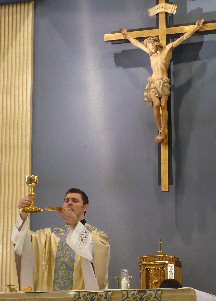 Doxology:
Doxology:
Prayer of Praise:
Through
him, with him, and in him, O God, almighty Father, in the unity of the Holy
Spirit, all glory and honor is yours, for ever and ever.
All: Amen.
Communion Rite
In the Liturgy of the Eucharist, we
symbolically offer ourselves to the Lord through the gifts of bread and wine.
At the Consecration, we offer our very lives to be united the God the Father
through the Cross of Christ. In Communion, we find that we have not died
at all, but have come to life. We have surrendered ourselves to God
through His Divine Son, Jesus Christ. In return become ennobled and
enriched. We give up time and we get eternity, we give up our sin and we
receive grace, we surrender our self-will and receive the strength of the Divine
Will, we give up ourselves and we receive everything. For the Son of God
says to us that unless we receive Him we shall not have Divine life in us.
But it is not really we who receive Christ as it is Christ who receives us,
bringing us into Himself.
God makes His Cross the very means
of our salvation and our life. While we have crucified Him, His eternal
love cannot be extinguished. Christ willed to give us the very life we
crucified in our Redemption, the Consecration of Holy Thursday into Communion,
His death into our everlasting life.
The Lord's
Prayer:
Priest: At
the Savior's command and formed by divine teaching, we dare to say:
Priest and
All: Our
Father, who art in heaven, hallowed be they name; Thy kingdom come; Thy will be
done on earth as it is in
heaven. Give us this
day our daily bread, and forgive us our trespasses, as we forgive those who
trespass against us; and lead us not into temptation, but deliver us from evil.
Priest: Deliver us, Lord, we pray, from every evil, graciously
grant peace in our days, that, by the help of your mercy, we may be always free
from sin and safe from all distress, as we await the blessed hope and the coming
of our Savior, Jesus Christ.
All: For the
kingdom, the power and the glory are yours now and forever.
Prayer for
Peace:
Priest: Lord Jesus Christ, who said to your Apostles: Peace I leave
you, my peace I give you, look not on our sins, but on the faith of your Church,
and graciously grant her peace and unity in accordance with your will. Who
live and reign for ever and ever.
All: Amen.
Priest: The peace of the Lord be with
you always.
All: And with your spirit.
Priest: Let us offer each other the sign of peace.
Breaking of the Bread:
Priest: May this mingling of the Body and Blood of our Lord
Jesus Christ bring eternal life to us who receive it.
Priest and All: Lamb of God, you take away the sins of the world,
have mercy on us.
Lamb of God, you take away the sins of the world, have mercy on us.
Lamb of God, you take away the sins of the world, grant us peace.
Priestly Preparation: Lord Jesus Christ, Son of the
living God, who, by the will of the Father and the work of the Holy Spirit,
through your Death gave life to the world, free me by this, your most holy Body
and Blood, from all my sins and from every evil; keep me always faithful to your
commandments, and never let me be parted from you.
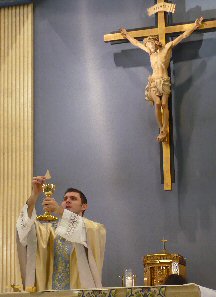 Priest: Behold
the Lamb of God, behold him who takes away the sins of the world. Blessed
are those called to the supper of the Lamb.
Priest: Behold
the Lamb of God, behold him who takes away the sins of the world. Blessed
are those called to the supper of the Lamb.
Priest and All: Lord,
I am not worthy that you should enter under my roof, but only say the word and
my soul shall be healed.
Priest: May the Body of Christ keep me safe for eternal life.
May the Blood of Christ keep me safe for eternal life.
Communion Antiphon:
Communion Antiphon:
John 14:15-16
If you love me, keep my commandments, says the Lord, and I will ask the
Father and he will send you another Paraclete, to abide with you for ever,
alleluia.
Communion of the Faithful:
Priest:
The Body of Christ.
The Faithful: Amen.
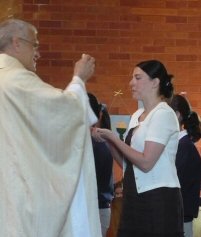
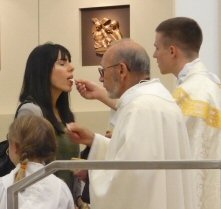
Priest/Deacon/
Extraordinary Eucharistic Minister:
The Blood of Christ.
The Faithful: Amen.
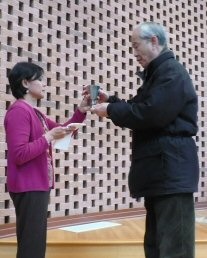
Cleansing of the Vessels:
Priest: What has passed our lips as food, O Lord, may we
possess in purity of heart, that what has been given to us in time may be our
healing for eternity.
Prayer after Communion:
Priest: Let us pray.
Priest: Almighty
ever-living God, who restore us to eternal life in the Resurrection of Christ,
increase in us, we pray, the fruits of this paschal Sacrament and pour into our
hears the strength of this saving food. Through Christ our Lord.
All: Amen.
Concluding Rite
Priest: The Lord be with you.
All: And
with your spirit.
Priest: Bow
down for the blessing.
Dismissal Prayer: (The priest may select
from several forms)
Priest: May God, who by the Resurrection of his Only Begotten Son
was pleased to confer on you the gift of redemption and of adoption, give you
gladness by his blessing.
All: Amen.
Priest: May he, by whose redeeming work you have received the gift
of everlasting freedom, make you heirs to an eternal inheritance.
All: Amen.
Priest: And may you, who have already risen with Christ in Baptism
through faith, by living in a right manner on this earth, be united with him in
the homeland of heaven.
All: Amen.
Priest: And may the blessing of almighty God, the Father,
and the Son, and the Holy Spirit, come down on you and remain with you for ever.
All: Amen.
Priest: Go forth, the Mass in ended, alleluia, alleluia.
All: Thanks be to God,
alleluia, alleluia.
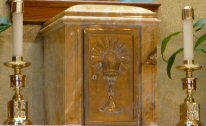 O my Jesus, forgive us our sins.
O my Jesus, forgive us our sins.
Save us from the fires of hell.
Lead all souls to heaven,
especially those in most need of your mercy.
www.Divinemasterplanforlife.com
www.Saintsnheaven.com
Top
Home Page
Liturgical
Year Cycle C 12-13
 Liturgy
of the Word
Liturgy
of the Word The Gospel:
The Liturgy of the Word is completed
by the reading of the Gospel. Before its reading, the members of the
assembly trace the sign of the cross upon the forehead to indicate their mental
acceptance of the Truth, on the lips to indicate their readiness to announce it,
and over the heart to indicate their sincere desire to accept it into their
lives. The "Good News" of the Gospel tells that God's kingdom has come for
all to hear, accept, and announce to the world for its salvation. It
is God who is speaking to us. Christ comes to teach us by the example of
His life and by His own words.
The Gospel:
The Liturgy of the Word is completed
by the reading of the Gospel. Before its reading, the members of the
assembly trace the sign of the cross upon the forehead to indicate their mental
acceptance of the Truth, on the lips to indicate their readiness to announce it,
and over the heart to indicate their sincere desire to accept it into their
lives. The "Good News" of the Gospel tells that God's kingdom has come for
all to hear, accept, and announce to the world for its salvation. It
is God who is speaking to us. Christ comes to teach us by the example of
His life and by His own words.
 The Liturgy of the Eucharist
The Liturgy of the Eucharist what
God would have us become. Our own little cross can lift us into union with
Christ's Cross so we may earn the joys of
everlasting happiness with God the Father.
what
God would have us become. Our own little cross can lift us into union with
Christ's Cross so we may earn the joys of
everlasting happiness with God the Father.
 Take this, all of you, and drink from it; for this is the chalice of my
Blood, the Blood of the new and eternal covenant, which will be poured out for
you and for many for the forgiveness of sins. Do this in memory of me.
Take this, all of you, and drink from it; for this is the chalice of my
Blood, the Blood of the new and eternal covenant, which will be poured out for
you and for many for the forgiveness of sins. Do this in memory of me. Priest:
Priest:  Doxology:
Doxology:
 Priest: Behold
the Lamb of God, behold him who takes away the sins of the world. Blessed
are those called to the supper of the Lamb.
Priest: Behold
the Lamb of God, behold him who takes away the sins of the world. Blessed
are those called to the supper of the Lamb. 


 O my Jesus, forgive us our sins.
O my Jesus, forgive us our sins.